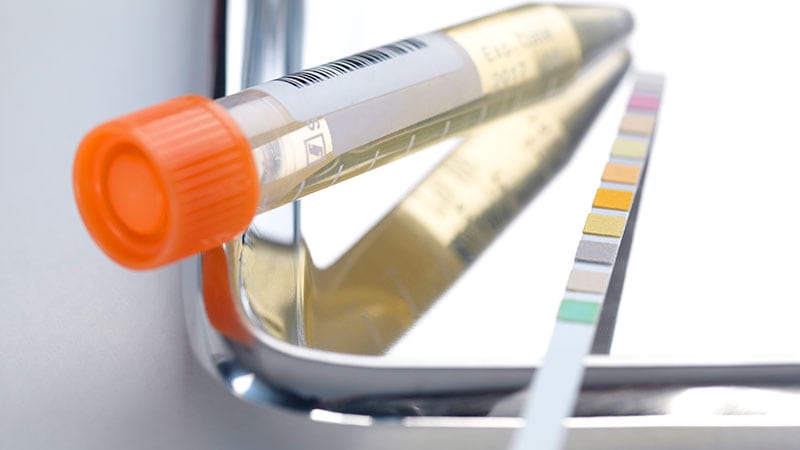Concepts de base
Urine test shows promise for diagnosing urothelial carcinoma and predicting recurrence risk accurately.
Résumé
A urine test, uCGP, accurately diagnoses urothelial carcinoma and predicts recurrence risk. The test is more accurate than traditional clinical risk factors. It identifies mutations in 60 genes associated with bladder cancer. The test's performance was evaluated using 581 samples, showing high specificity and sensitivity for diagnosis and surveillance. The test enables noninvasive, accurate diagnosis and risk stratification for urothelial carcinoma patients.
Urine Test Shows Promise for Diagnosing Urothelial Carcinoma
Stats
The uCGP assay had a specificity of 90% and sensitivity of 95% for diagnosing urothelial carcinoma.
The test was six times more accurate than traditional clinical risk factors for predicting recurrence.
The test demonstrated a specificity of 90% and sensitivity of 95% for an initial diagnosis of urothelial carcinoma.
Citations
"The idea is that this could be used as kind of a first-pass screening tool for patients with hematuria that could potentially obviate the need for undergoing imaging such as CT scans or cystoscopy." - Keyan Salari
Idées clés tirées de
by Neil Osterwe... à www.medscape.com 08-29-2023
https://www.medscape.com/viewarticle/995950
Questions plus approfondies
How can the implementation of this urine test impact the early detection of urothelial carcinoma?
The implementation of the urinary comprehensive genomic profiling (uCGP) assay for diagnosing urothelial carcinoma can significantly impact early detection. With a specificity of 90% and sensitivity of 95%, the test accurately identifies individuals with urothelial carcinoma, even in cases of hematuria. This means that the test can effectively detect the presence of the disease in its early stages, allowing for prompt intervention and treatment. Additionally, the test's ability to predict the risk of recurrence for patients under surveillance is six times more accurate than traditional clinical risk factors, enabling proactive monitoring and management of the disease. Overall, the uCGP test holds great promise in enhancing the early detection of urothelial carcinoma, leading to improved outcomes for patients.
What are the potential drawbacks or limitations of relying solely on this urine test for diagnosis and surveillance?
While the uCGP test shows great potential for diagnosing and monitoring urothelial carcinoma, there are some drawbacks and limitations to consider when relying solely on this test. One limitation is the cost associated with the test, as it may not be currently reimbursed by Medicare and could pose financial challenges for patients without adequate insurance coverage. Additionally, the test's accuracy may vary depending on the specific characteristics of the tumor, with slightly lower sensitivity for low-grade tumors compared to high-grade and muscle-invasive tumors. Another limitation is the need for further validation and standardization of the test across different patient populations to ensure consistent and reliable results. Therefore, while the uCGP test offers significant benefits, it should be used in conjunction with other diagnostic tools and clinical assessments to ensure comprehensive and accurate diagnosis and surveillance of urothelial carcinoma.
How can advancements in genomic profiling technology further revolutionize cancer diagnosis and treatment?
Advancements in genomic profiling technology have the potential to further revolutionize cancer diagnosis and treatment by providing personalized and targeted approaches to patient care. Genomic profiling allows for the identification of specific genetic mutations and alterations associated with different types of cancer, enabling oncologists to tailor treatment strategies based on the individual's unique genetic profile. This precision medicine approach can lead to more effective therapies with fewer side effects, as treatments can be selected based on the genetic characteristics of the tumor. Additionally, genomic profiling can help predict a patient's response to certain treatments, allowing for the optimization of therapy and the avoidance of ineffective or harmful interventions. Overall, advancements in genomic profiling technology hold great promise in improving cancer diagnosis and treatment outcomes, ushering in a new era of personalized medicine in oncology.
0
